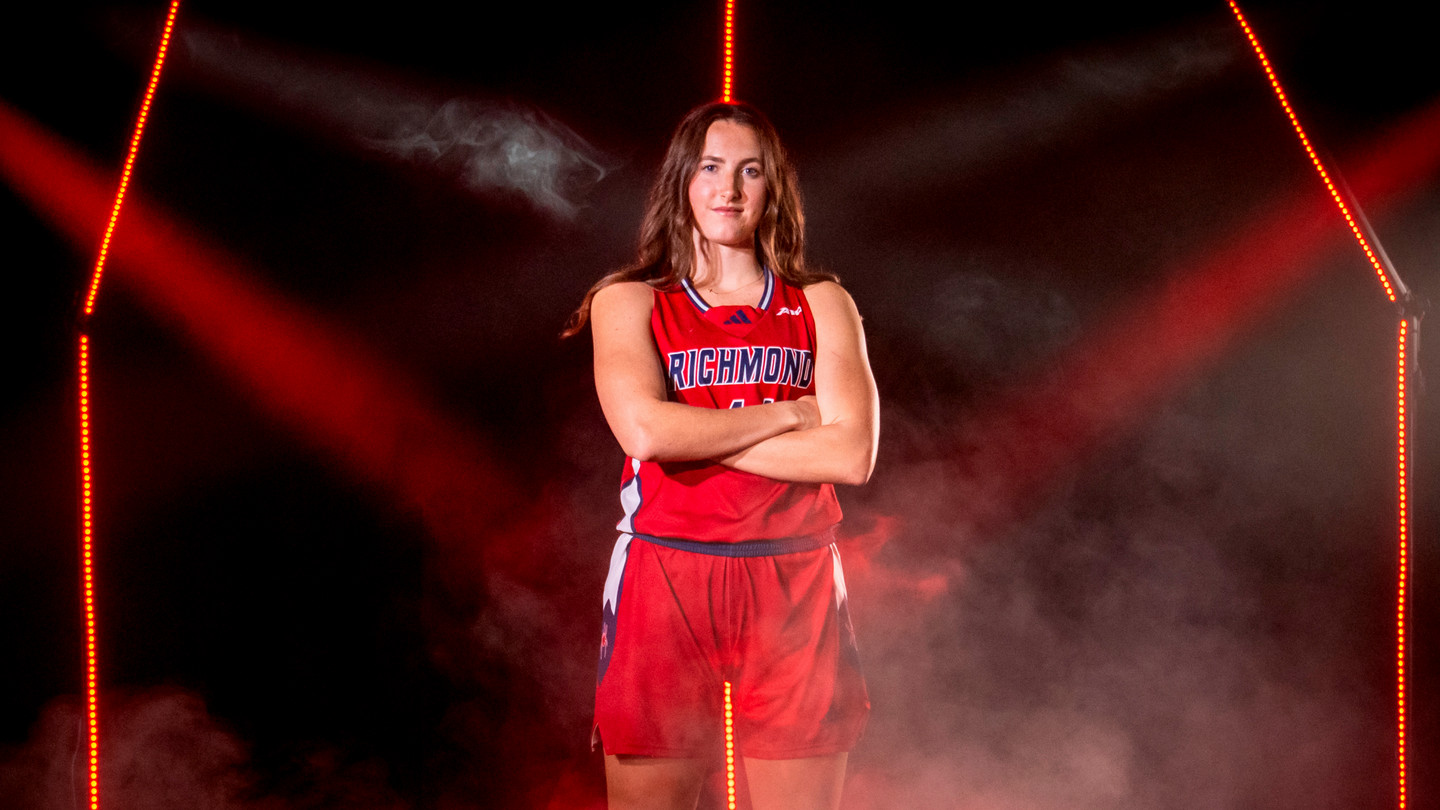Senior Maggie Doogan can’t know yet when she’ll score the final basket of her college career. She can’t know how far the team will take itself in the months to come, what court they’ll be playing on when the buzzer sounds for the last time this season, how many points they’ll put on the board in the final game of her four years as a Richmond Spider.
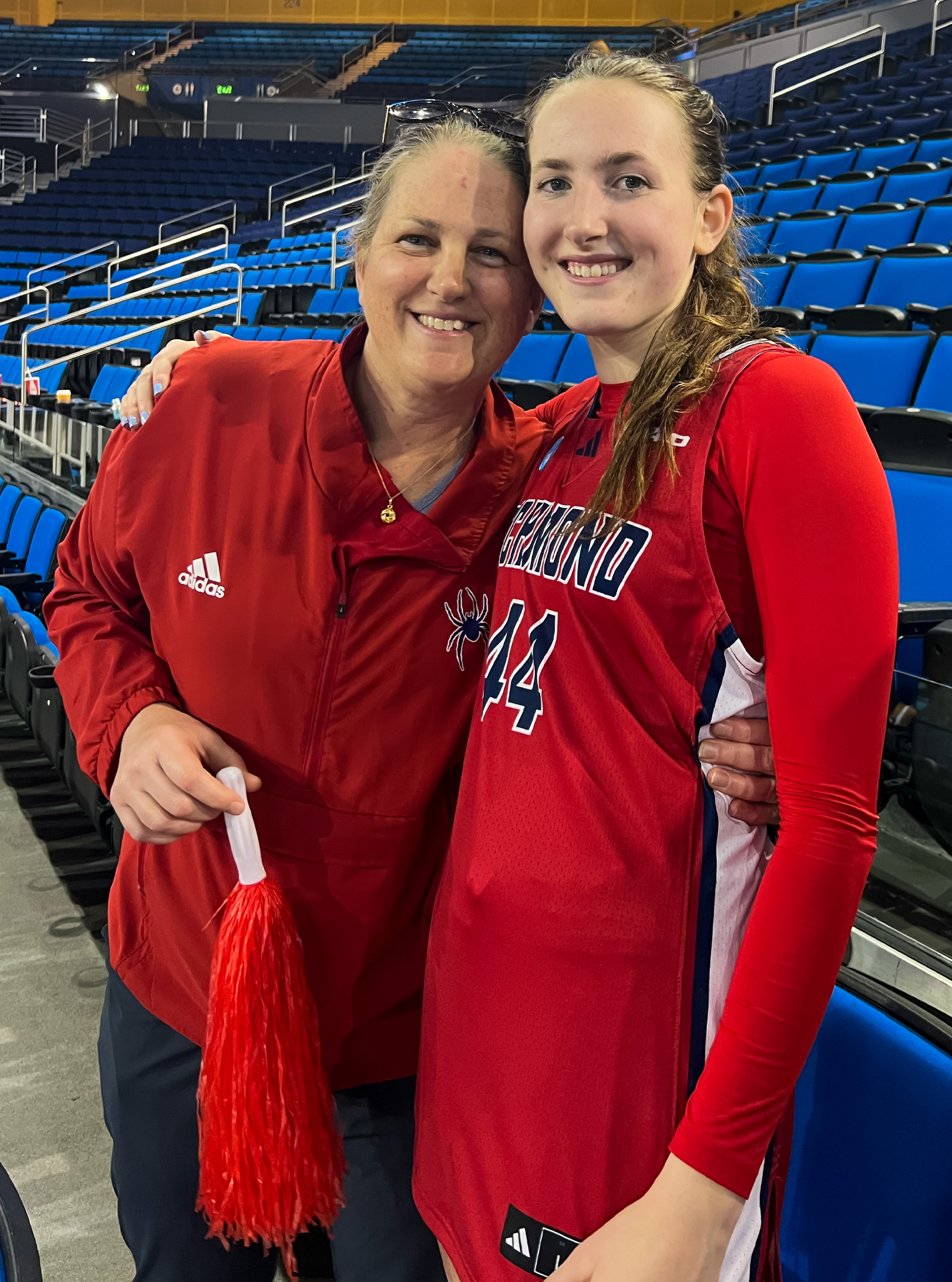
All that, for now, is unknowable. But when that day comes and she walks off that court and into whatever her future holds next, there is one person who will know, better than anyone else possibly could, what Maggie is feeling. Her mother, Chrissie Doogan, has been there for all of it.
Chrissie has been there as a standout college athlete herself, playing basketball for four years at La Salle when she was Chrissie Donahue and earning herself a spot in Philadelphia’s Big Five Hall of Fame. She’s been there as a collegiate coach, at both La Salle and Cornell. She’s been there as Maggie’s coach for the four years her daughter played at Cardinal O’Hara High School outside Philadelphia, where Chrissie is now athletic director, girls basketball coach, and herself an alumna and former player. She’s been there to watch her daughter grow from skinny kid — all arms and legs and potential — to commanding athlete who last year helped power her team to its first NCAA Tournament win in program history.
And she’s been there for all of Maggie’s life as her daughter’s rock, her sounding board, her cheering section, her safe space, her shoulder to cry on, her tough love when it’s needed, her good advice, her give-it-to-you-straight, her here-when-you-need-me, the person Maggie still calls every day, the one she talks with after every game. Her mom.
GROWING INTO THE GAME
No big surprise, Maggie Doogan grew up in a sports family. The oldest of four, she certainly had a basketball in her hands before she could even name the game, hung out at the La Salle gym when her mother coached, met the players in the locker rooms. By first grade, she was learning to dribble and shoot in open gyms. By middle school, she was playing with an AAU team in the Philadelphia suburbs where “Philly basketball” is akin to a religion — and the fiercely competitive high school Catholic League, which includes Cardinal O’Hara, offers a steady stream of talent often sought out by college recruiters.
Still, Chrissie was not determined that basketball would be Maggie’s destiny. “I knew she would be tall and would be athletic,” says Chrissie, but “I always said she didn’t have to play basketball. I wanted her to play because she loved it.” So as Maggie grew up “she did a little bit of everything,” says Chrissie. There were soccer and volleyball and lacrosse in addition to basketball.
Her height wasn’t necessarily doing her any favors in those years. “I was always on the tall side,” Maggie recalls, and while she was a solid athlete, it was hard for her skills development to keep up with her ever-growing frame. By high school — she was a Cardinal O’Hara girl now — she’d settled on volleyball and basketball, “but her legs hadn’t caught up with her body,” says Chrissie. “She was gangly, and she ran like a deer.”
Chrissie the coach knew that promise can take time to develop, however, and in a world where youth sports tap kids for advancement and accolades before they’ve mastered long division, early success doesn’t always predict future performance. “You don’t want your kid to be the best player on the team in 6th grade,” she says.
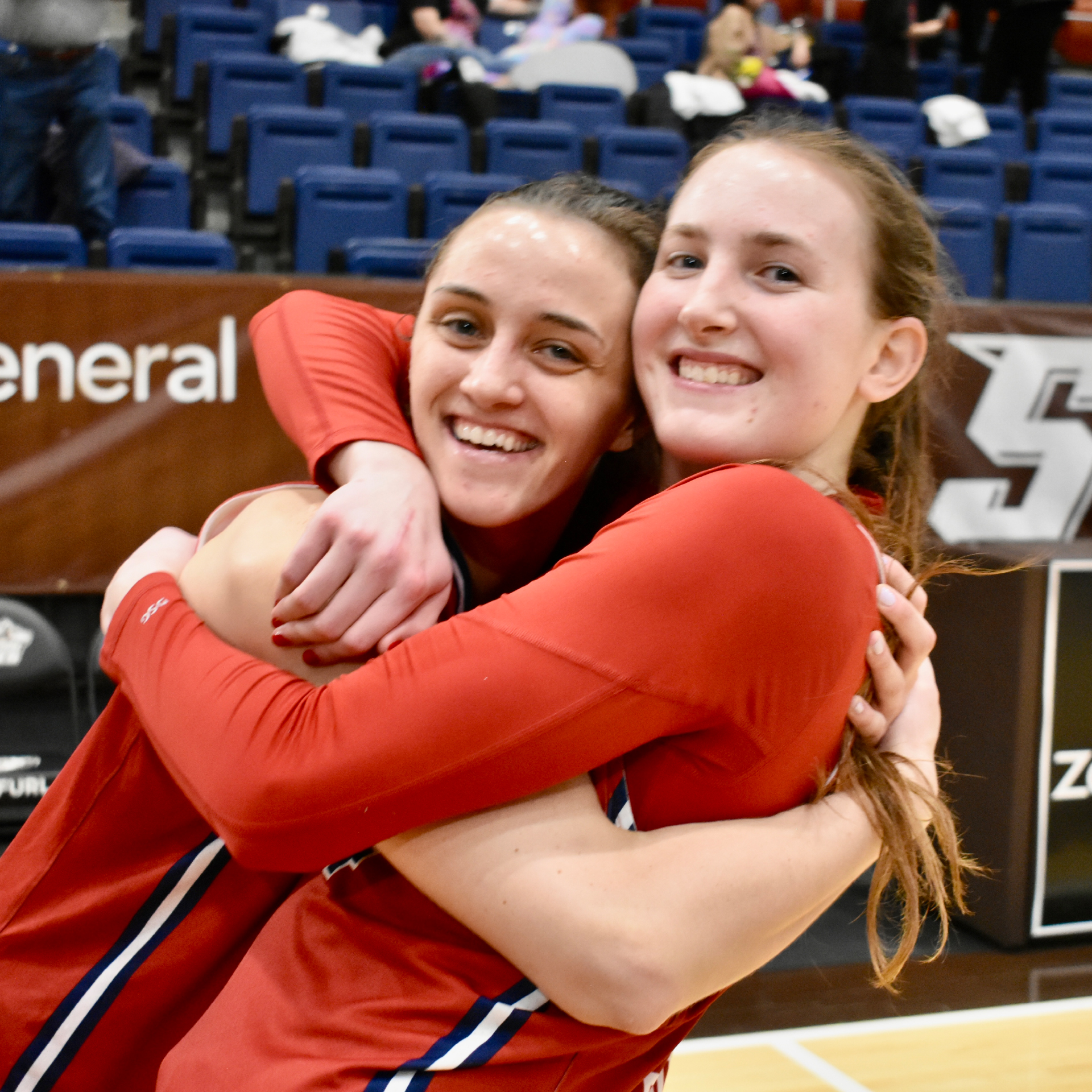
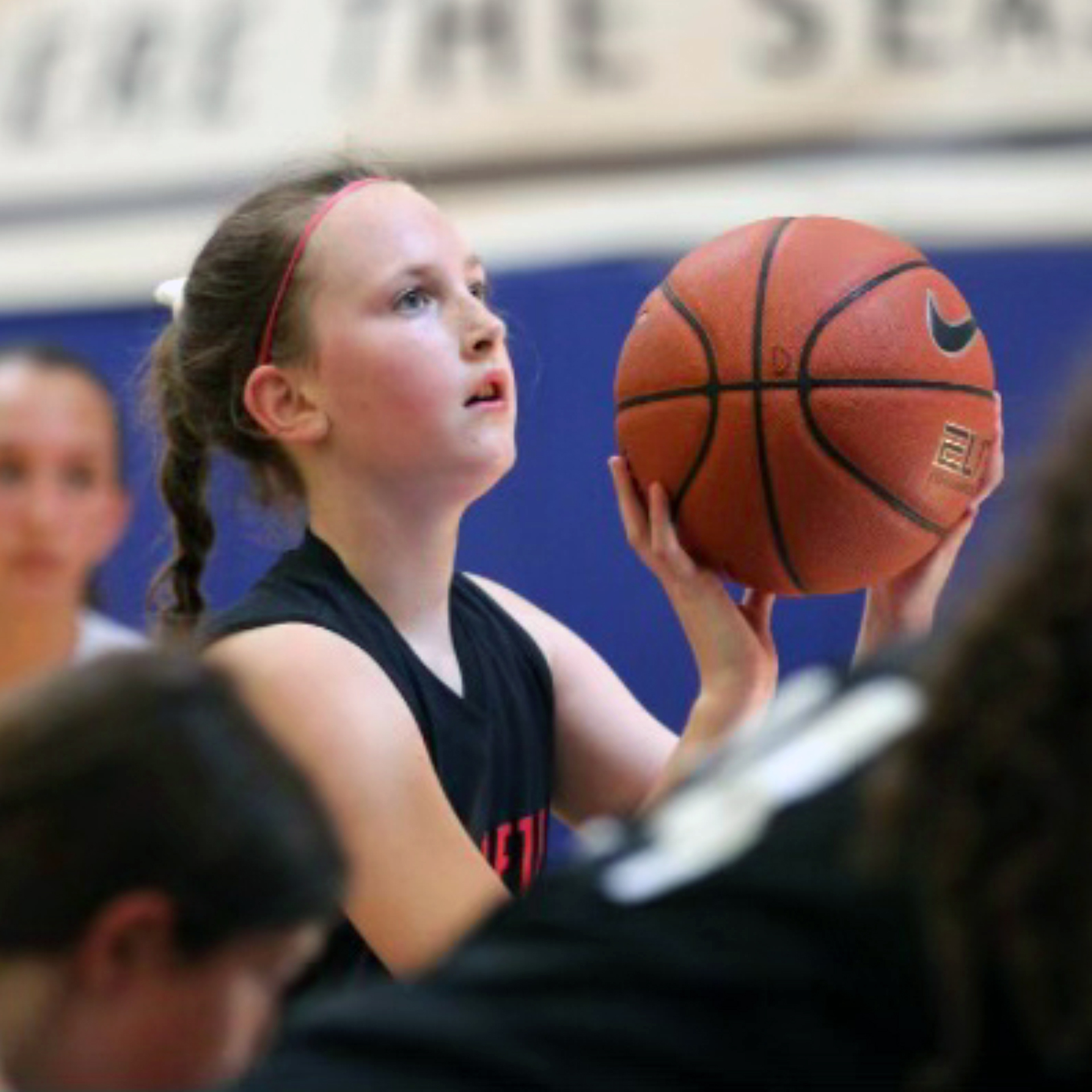
Still, when Maggie started high school, “She went through not being the best player and not getting the ball enough and sitting on the bench because, literally, her body wasn’t there yet,” says Chrissie. During Maggie’s freshman year at Cardinal O’Hara, she and Chrissie went to watch a D3 team play, and Chrissie thought, “Alright, she’ll be able to play at Division III.”
In her sophomore year, though, something clicked. Maggie was on the court. She was getting the ball. That spring, the team made it to the state championship quarterfinals.
Then the pandemic hit.
The championship was cancelled. Schools closed. Nobody knew when team play might resume, and, as the weeks dragged into months, it was possible to wonder whether normal life might ever return. Maggie, however, was determined to be ready. “She really knew she loved the game when it was taken away from her,” says Chrissie.
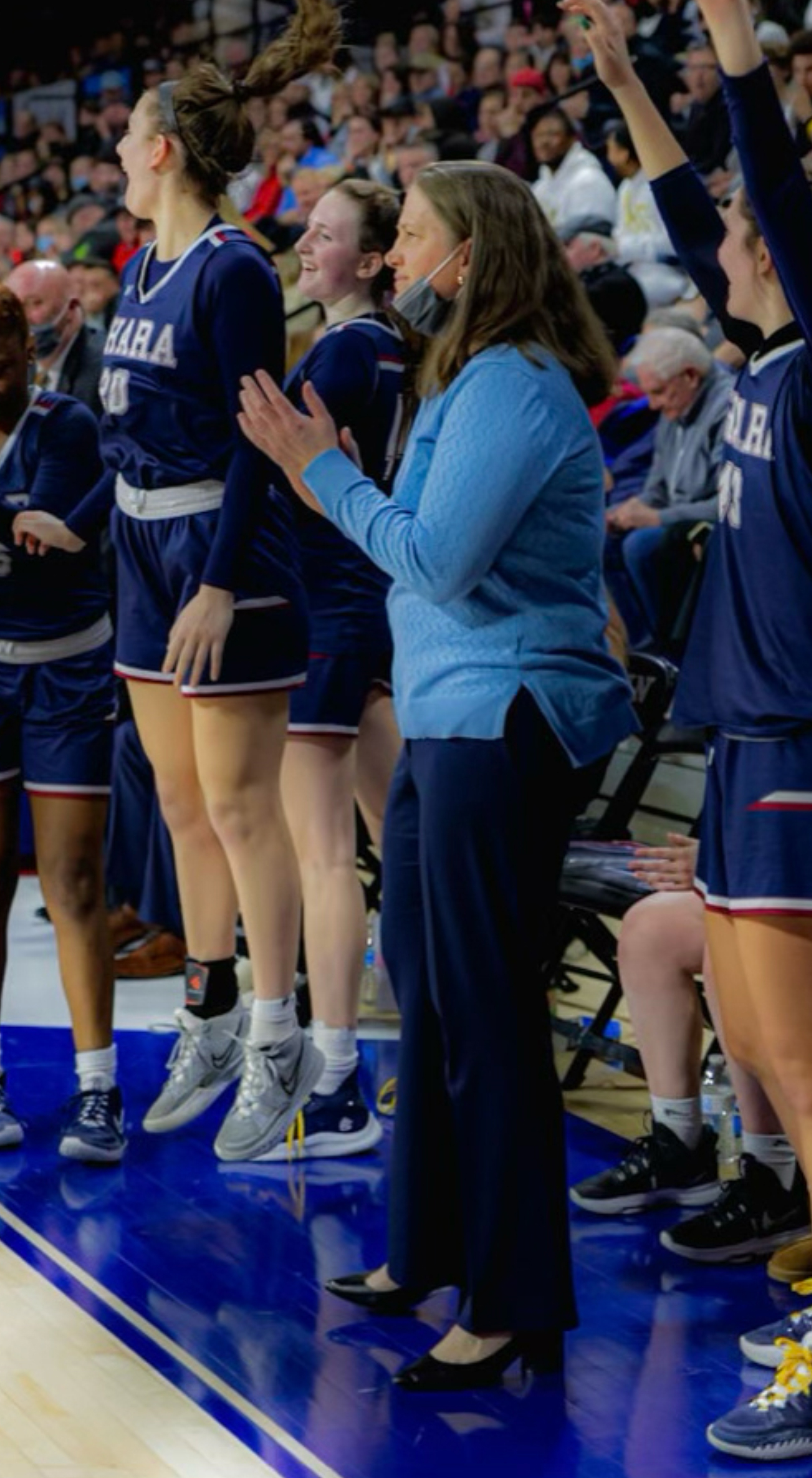
“We didn’t know when or if a season would start, and not knowing turned into me wanting to keep playing,” agrees Maggie. “I committed to run and stay in shape. We didn’t have any games, so I pulled my father out in the driveway for one-on-one. I watched a lot of film during that period, and that helped the mental side.” Studying the game for hours, she honed her IQ, basketball-speak for analyzing and understanding to the point of developing an instinct for play almost beyond thought. “I really learned a lot,” says Maggie. “COVID was a blessing in disguise.”
When masked play in empty gyms began later in the summer, Maggie threw herself back into the game with everything she’d learned and the conditioning she’d brought from all those long runs and driveway games with her dad. “Junior year, she became my best player,” says Chrissie. They won their state championship that year and again in her senior year, along with an even sweeter victory, taking the Philadelphia Catholic League championship. Maggie’s play improved too with a strong AAU team outside the school season. “It helps when you play against good kids,” says Chrissie. Seven members of the team would go on to play in college, including future Spider Maggie.
CHOOSING A FUTURE
When the offers started coming as Maggie headed into her junior year of high school, some of them were from the big schools, the ACC schools, places she’d earned the opportunity to shoot for with the hard work she’d put in and the growth she’d shown as a player. It was exciting to imagine where she might go, whose jersey she could wear, which coach could help her take her game to the next level.
Where would she thrive, though? Where could she be sure she could contribute from the start, get on the court and not risk finding herself warming the bench waiting her chance? Where could she be happy with the full college experience, not just on the court but off it as well? As Maggie’s mother, as a coach, as a former collegiate player herself, Chrissie knew how important this choice would be. She also knew how important it was that Maggie make the decision for herself.
Richmond was on their radar, though — Chrissie had known women’s basketball associate head coach Jeanine Radice for years — and Maggie was on Richmond’s.
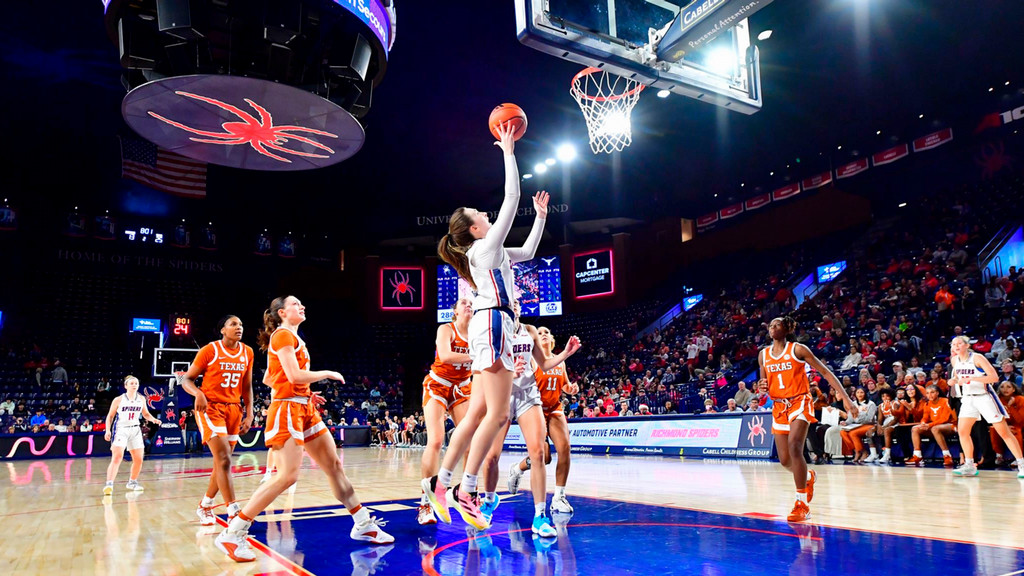

“I thought she would be a difference-maker if we could get her.”
“The thing that stood out was her versatility,” says women’s basketball head coach Aaron Roussell. “I felt like she could do a lot of things at different spots on the floor.” Her height (6 feet, 2 inches), and her ability to handle and shoot the ball, her basketball IQ, her competitive drive were all already notable. And there was something about her game “that seemed to fit our style,” says Roussell. “She reminded me of players who had had success in our system before.” He believed Maggie had something special she could bring to Richmond. “I thought she would be a difference-maker if we could get her.”
Like Chrissie, though, Roussell knew the choice had to be Maggie’s. “He never put pressure on her to commit to Richmond,” says Chrissie. “He wanted her to make the decision herself. He said, ‘Do your homework, look at other schools, and if you want Richmond, let me know when you’re ready to come.’”
She decided she was ready. A Spider she would be.
A FIRST-YEAR SETBACK
Chrissie was excited to see Maggie headed to Richmond, even though she knew there would be challenges. “I wasn’t sure she would be strong enough,” she says. “They are big strong players at Richmond.” Still, “The system Aaron runs at Richmond, you need IQ,” says Chrissie, and she knew Maggie brought that, along with a deep, tireless passion for the game. “She loves basketball. She watches the film. She studies the game a lot.”
She did get on the floor that first year, too, but “it took me a little bit to get into the groove,” acknowledges Maggie. The college game was much faster, the players stronger, and there was a whole new level of intensity from what she’d experienced in high school. “I definitely had to think on my toes,” she says. She was grateful that the older teammates were generous with their guidance to help with the transition. Working with a strength coach for the first time, she was determined, too, to build the power she needed.
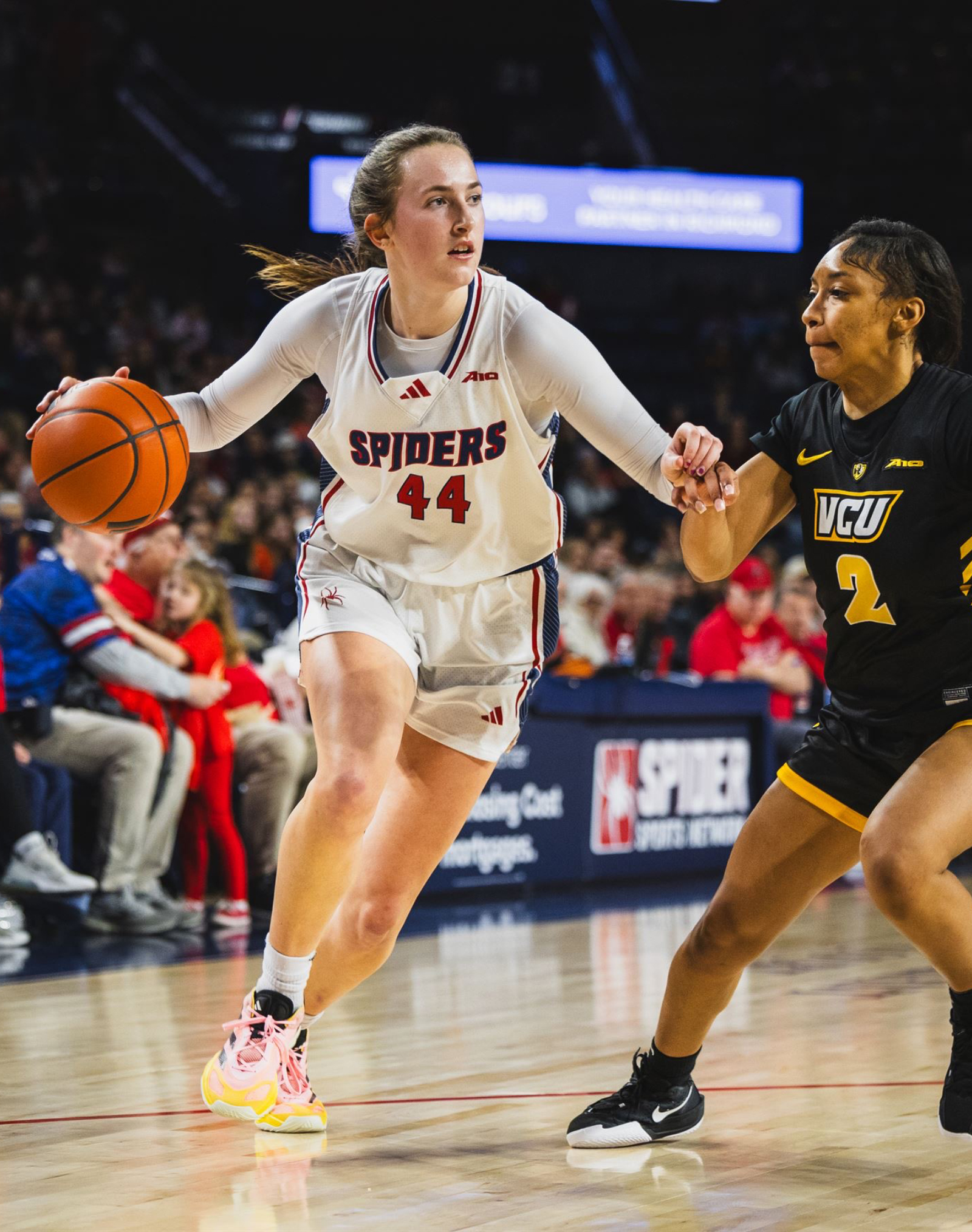
“She has dedicated a lot of time to get into the right physical shape to compete at this level,” notes Chrissie.
In a Thanksgiving tournament, though, Maggie broke her hand. It was a severe enough fracture that it required surgery and recovery. The injury took her off the court for seven games, but as she had during the pandemic, she turned a setback into an opportunity. “She was able to sit out and study the game more. She learned the system and the players,” says Chrissie. Once again, her work paid off. “When she came back from the surgery, she became a starter,” Chrissie notes.
“My first year put me on the radar with other teams and gave me some respect from my peers,” recalls Maggie. There was also a confidence-booster in finishing strong despite missing that stretch of her first season. “I knew I would most likely continue to start for my second and third years,” she says.
BUILDING A TEAM
Since arriving at Richmond in the spring of 2019, Aaron Roussell has pursued a vision for the program he wanted to build, one that demands uncompromisingly high standards of hard work and commitment from his players, but that asks them to believe that effort will be rewarded. Richmond, he told his team from the beginning of his tenure, could become a program people talked about.
Addie Budnik, ’24, was among the players in Roussell’s first recruiting class who took the court for a rookie 2020-21 season in the shadow of the pandemic. “His big sell to us,” she says, “was ‘I can’t promise you anything, but in four years the goal is a championship, and I think we can get there.’”
When Maggie joined the team two years later, Spiders women’s basketball was coming off a respectable eighth place finish in the A-10 rankings the previous season. In her first year, the team made it to the semi-finals of the A-10 championship and fourth place.
Then came Maggie’s second year with the Spiders. The team charged through the 2023-24 season to a 29-6 overall and 16-2 conference record. Regular season champions, they went on to win the A-10 conference championship — making good on the four-year goal Roussell had set for the team.
“My first year put me on the radar with other teams and gave me some respect from my peers.”
From there, they took their game to the NCAA Tournament as a No. 10 seed. They lost in the first round to No. 7 seed Duke, but it was a loss that still felt like a kind of victory, the first time the team had made it to the Big Dance since 2005.
In Maggie’s third year, the team proved that the previous season had been no fluke, with a 28-7 overall season and 17-1 conference record. Though they suffered a painful single-point loss at the buzzer in the semifinals of the A-10 tournament, they earned an at-large bid and No. 8 seed in the NCAA Tournament.
In the first round of their second consecutive trip to the dance, the team faced No. 9 seed Georgia Tech. They were ready. The Spiders dominated throughout, and when the final buzzer sounded for a 74-49 win, the team erupted in celebration of their accomplishment — the first NCAA Tournament victory in the program’s history. The whole team had played strong, but the undisputed standout of the game, with 30 points, 15 rebounds, and six assists, was Maggie Doogan. And though they were defeated in their second-round game against No. 1 seed UCLA, Maggie put in another notable performance, leading her team with 27 points, seven assists, and two blocks.
Going into that game, says Maggie, their win against Georgia Tech filled them with the confidence to play their best. “I was so proud of how we played and how we held ourselves,” she says. “If we were going to lose in the NCAA Tournament, I would want to lose that way.”
It was clear now that Roussell’s vision had become a reality. People were talking about Richmond. And they were talking about Maggie Doogan, too. She was named the A-10’s 2025 Women’s Basketball Player of the Year, the first Spider to win that accolade in program history. Other recognition followed. In an article making early predictions about the top prospects for the 2026 WNBA draft, The New York Times wrote, “Doogan is so smart in the half court, constantly moving without the ball and finding teammates to turn good shots into great ones.”
FOR THE LOVE OF PLAY
For all the accolades, however, Maggie is the first to deflect the focus from herself, to champion and credit the work of her teammates and her coaches. “My favorite part of watching Maggie play is that she doesn’t act like a star player,” says Chrissie. “She genuinely gets excited to see her teammates’ success.”
What does Maggie bring to the team? Her teammates will tell you she is fiercely competitive. “Nobody wants to win as bad as she does,” says junior Ally Sweeney, who is playing her third season with Maggie this year.
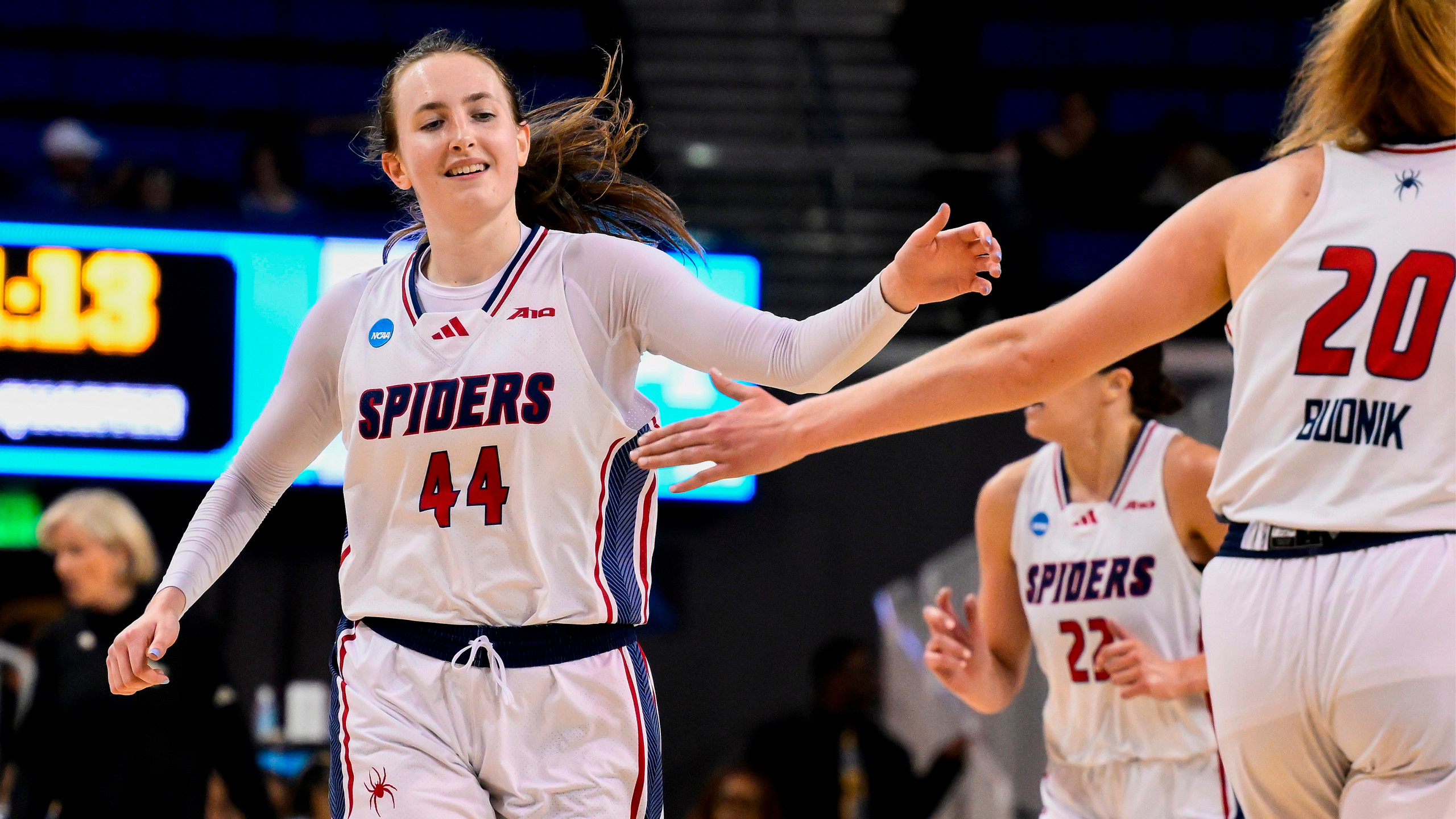

“My favorite part of watching Maggie play is that she doesn’t act like a star player. She genuinely gets excited to see her teammates’ success.”
They’ll tell you she marries that competitiveness with an uncompromising work ethic, putting in hours beyond scheduled practices and workouts to watch film, study the game, shoot baskets, refine her technique, build her strength, learn the moves and the opponents and her teammates, understand all the possible actions and reactions and positions. “Maggie is definitely incredibly driven and motivated. She’ll be in the gym, putting the work in, going above and beyond,” says Budnik.
Played at this level, basketball is a kind of choreographed improv, a carefully rehearsed chaos, moving too fast for thought. All the work she puts in, Maggie says, is so that on game day, “I click into a different consciousness. I don’t think, I just do.”
“I taught her not to think when she is on the court,” says Chrissie.
That work is powered, though, not by cheerless grind but by a deep joy, a delight in being able to step onto the court again and again with her team, day after week after month after year. “I love going out every day and playing with my best friends,” Maggie says.
“She is passionate about her sport, and she wants to do her best, and she wants her teammates to do good,” says fellow senior Rachel Ullstrom, Maggie’s roommate, best friend, and teammate for the past four years.
“We are not who we are without her,” agrees Sweeney. “We are really thankful for that.”
LOOKING FORWARD
Now, headed into her final Spider season, Maggie knows that Richmond is no longer the underdog team. “We are an established program, and people are going to come after us. We know we are going to be hunted, but we also have to hunt, keep going after every team,” she says.
She knows that she’s in the spotlight as well. Yet, “I am approaching the season as I would every other season,” she says, making sure “I am doing all the little things on the court that are necessary for us to succeed.” At the same time, Maggie, who majors in business administration and minors in leadership studies, is investing in building a legacy for the team that will last beyond her own or any other player’s individual contribution “I have to make sure that I am being a good example for the younger players,” she says. “Teach them it is hard to do really good things, instill that hard-work culture.”
Her mother is excited to see what the year will bring. “She loves her teammates, loves her school, loves playing,” Chrissie said before the season tipped off. “She is super happy, and she can’t wait for the season to get started.”
She knows from experience, however, that a final season can be bittersweet as well, so she is encouraging Maggie to relish all of it. “It is her last year with her best friends,” says Chrissie. “You are going to remember the bus trips and the plane rides and the hotel rooms as much as these games, so make every moment count.”
And what comes next? Time will tell, but “I don’t think that she has hit her peak yet,” says Chrissie. “I think she is still developing and getting better and hungry.” Having coached plenty of seniors “who are ready to move on with their lives and get jobs,” she can see that her daughter isn’t there yet. “I think she wants to continue to play the game and get better.”
So the story of Maggie Doogan is still being written. Tonight, though, she’ll be calling her mom as always to check in on the day. Tomorrow, she’ll be back on the court.
“I never get tired of it,” says Maggie. “There is never a day that I wish I didn’t play.”
